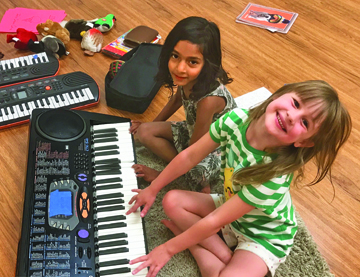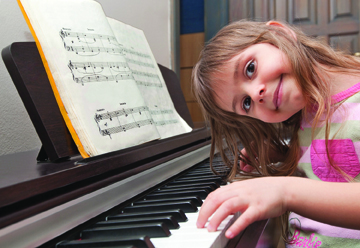Piano Playtime For Preschool Children Hits All The Right Notes With Valley Parents
by Glen Richardson

Child’s Play: Students at newly launched Gymboree Play & Music get the best possible start in overall brain development, confidence, and just plain old fun.
All right everybody gather around because the Piano Playtime kids are here. What kind of tune do you want to hear? They can play anything you want because they’re smart.
What is Piano Playtime you ask? It’s a carefully designed program for two-and-a-half to five-year-olds. Around for more than 30 years, it currently serves many private preschools in Denver’s north and west suburbs. This fall the program was formally launched at Gymboree Play & Music at I-25 and Hampden. In-home classes for groups of four or more are also offered.
Why? It gives your young one the best possible start in overall brain development, confidence, and just plain old fun! Many Piano Playtime veteran families have watched their young ones grow into amazing young musicians. They have balanced interests and varied strengths and continuous joy in learning. The program uses a rich, play-based curriculum for preschoolers. It is based on recent research in early piano learning to promote child brain development. Instruction is rooted in Gordon Research, Kodaly, Montessori, and Suzuki principles. It uses “ear before eye” for concentrated neuro-network activity. It builds higher intelligence, encourages full brain integration and full use of all sensory inputs.
Studies Support
Many recent studies in Neuroscience conclude that learning to play the piano during the preschool years is the most beneficial of any activity for building intelligence and brain function, increasing neuro-networking, concentration, coordination, confidence and brain integration. Learning piano before the age of seven grows physically larger brains. Moreover, preschool classes in violin, computers and foreign languages pale in comparison.
Piano Playtime has been carefully designed in program and curriculum to emulate language learning and literacy because music is a language, the universal language. We all learn to fluently speak our mother tongue by age six, quite miraculously without any formal study. Just being in a community with loving family, friends and loved ones gives the impetus to learn our language in a very natural and amazing way, auditory. Thus, music, specifically piano, is learned in the same way, beginning at age three when the auditory inputs are at their maximum and finger isolation begins to develop.
This is especially important for little boys. They are typically born without the ability to integrate L/R brain and are often 12-18 months behind in brain development throughout the preschool-early elementary years.

Preschool Brilliance: The piano tops computer, foreign language and violin classes in helping preschoolers function at higher levels.
Keyboard Playing Field
Many parents spend $50 or more per month for their preschoolers to play sports or other activities that have little effect on brain development or basic intellectual growth through increased brain size. Piano is the only activity that has been proven to do this. The studies are numerous and staggering in their conclusions: such as the piano tops computer, foreign language and violin classes in helping preschoolers function at higher levels and use more of their brain not only during class times but transferring to all other areas of neural function. The benefits last for a lifetime. Seems like a small price to pay for such enormous benefits.
Considering how critical the preschool years are for developing neural networks that last a lifetime, it seems shortsighted in point of view to keep preschool piano as a “luxury” rather than a staple for preschoolers.
Pre-K Standards
Piano activates, accelerates and permanently expands many neuron centers of learning. This includes speech-language, fine motor, auditory processing, visual-spatial reasoning, social-interactive, cognition, confidence and more. Playing by ear, learning beginning pre-reading skills, improvising, and creating music are all basics of the Whole Music Approach (WMA).
The program offers a well-designed curriculum based on research, natural developmental stages of children. Furthermore the curriculum is in alignment with the MENC National Standards for Pre-K. Providing fun and motivational support are key principles of the approach. WMA facilitates interactive learning and positive life skills. Parent education is a vital part of the curriculum.
The staff works with parents and caregivers to understand the vital happenings within the children’s environment that stimulate accelerated brain development, intelligence and activate nourishing relationships within the family through the children’s day to day musical learning. They make sure that parents know what is happening in the classes, encourage parent attendance and provide in-home music activities. A small class size of four to six children makes it piano intensive. Along with deeply caring parents, family, teachers and community, these benefits can only help expand the forward movement of human evolution.
Playful Package
“Play” is learning for the young child and the program takes your child’s play seriously. There is no other time in a child’s life when piano is so critical for accelerated brain growth. At Playtime classes in Denver and the Cherry Creek Valley, the Whole Music Approach (WMA) is used to develop young musicians who can play by ear, improvise freely and later compose and read music.
Youngsters are encouraged to create their own pieces, based on what they have mastered through reading music. Whatever style of piano kids and their parents would like to learn, instructors can customize lesson plans. The Whole Music Method paired with a piano is also perfect for students to create a life-long love of music. Kids are encouraged to participate in regular recitals and on-going performances and concerts.
